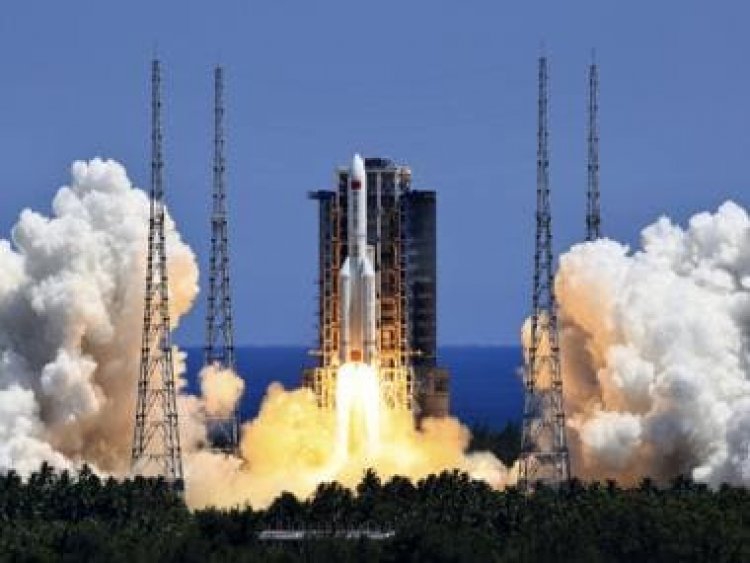China’s giant rocket booster plummeting to earth and no one is sure where it will land
China’s giant rocket booster plummeting to earth and no one is sure where it will land

A giant Chinese rocket booster is falling to earth and scientists aren’t exactly sure where it will land.
The 21-tonne rocket was part of the Wentian space station module (meaning quest for the heavens) launched on Sunday and docked with the Tiangong space station.
The uncrewed Wentian craft was propelled by a Long March 5B rocket from the Wenchang launch centre on China's tropical island of Hainan.
Let’s take a closer look:
Why is this happening?
As per Newsweek, the concern is that not all of the ejected first-stage rocket will burn up in the atmosphere and instead will crash into the planet.
After the rocket uses up all the fuel in the first stage, the empty part is ejected and falls to earth at high speed, usually burning up in the atmosphere.
But the Long March 5B is huge – measuring in at 10 storeys and 21 tonnes.
What do experts say?
Experts aren’t sure how much of the rocket will survive. Or where it will crash.
"It is always difficult to assess the amount of surviving mass and number of fragments without knowing the design of the object, but a reasonable "rule-of-thumb" is about 20-40 percent of the original dry mass," Holger Krag, head of the Space Safety Program Office for the European Space Agency, told SpaceNews.
McDowell said the rocket booster is floating freely in the low-Earth orbit.
"It will break up, but past experience shows that a bunch of 30-meter-long [100 foot] metal fragments will end up crashing into the ground at a few hundred km/hr," said Jonathan McDowell, an astronomer at the Harvard-Smithsonian Center for Astrophysics, in a tweet.
McDowell tweeted that the core stage was not actively deorbited although it is not clear when or when the spent rocket would crash.
“Unfortunately we can’t predict when or where,” McDowell told Gizmodo via email.
“Such a large rocket stage should not be left in orbit to make an uncontrolled re-entry; the risk to the public is not huge, but it is larger than I am comfortable with,” McDowell was quoted as saying by Gizmodo.
China chooses uncontrolled falls yet again
As per Space.com, this is the third time China has opted not to control the disposal of the first stage of the Long March 5B rocket after similar uncontrolled falls in 2020 and 2021.
As per The New York Times, the first Long March 5B in 2020 re-entered over West Africa with debris causing damage but no injuries to villages in the nation of Ivory Coast.
When the booster from the second launch, in 2021, splashed harmlessly in the Indian Ocean near the Maldives, NASA’s Bill Nelson took the Chinese to task.
“It is clear that China is failing to meet responsible standards regarding their space debris,” he was quoted as saying by the newspaper.
Hua Chunying, a senior spokeswoman at the Ministry of Foreign Affairs, responded by accusing the United States of “hype.”
Under Chinese President Xi Jinping, the country's plans for its heavily promoted "space dream" have been put into overdrive.
China has made large strides in catching up with the United States and Russia, where astronauts and cosmonauts have decades of experience in space exploration.
"The CSS (Chinese Space Station) will complete its construction... in one and half a year which will be the fastest in history for any modular space station," said Chen Lan, analyst for the site Go-Taikonauts.com, which specialises in China's space programme.
"In comparison, the constructions of Mir and the International Space Station took 10 and 12 years respectively."
China's space programme has already landed a rover on Mars and sent probes to the Moon.
In addition to a space station, Beijing is also planning to build a base on the Moon and send humans there by 2030.
China has been excluded from the International Space Station since 2011, when the United States banned NASA from engaging with the country.
While China does not plan to use its space station for global cooperation on the scale of the ISS, Beijing has said it is open to foreign collaboration.
Is the public at risk?
The risk of anyone getting injured is minimal, but not zero. Mainly because of how much of the earth’s surface is covered by water.
A recent study in Nature Astronomy pointed out that the practice of letting huge stages make uncontrolled falls to Earth creates "unnecessary risk," and that China is not alone in the practice despite international guidelines for falling space debris mitigation.
As per Newsweek, NASA has put the odds of a person being struck by a piece of space debris, also known as space junk –any man-made object in orbit about Earth which no longer serves a useful purpose – at around 1 in 3,200.
This, even as space debris is becoming more and more of a problem for humanity.
According to the most recent report of Orbital Debris Quarterly News, published by NASA’s Orbital Debris Program Office, there are 25,182 pieces of space debris, of sizes larger than 10 cm, in the lower earth orbits which are within 2,000 km of earth’s surface.
Of these, India is responsible for only 114 space debris objects, whereas the United States has 5,126 objects that can be categorised as space debris in the earth's orbit and China has 3,854 objects, including spent rocket bodies, orbiting the earth.
The report also mentioned that India’s space debris levels had come down to the 2018 levels after it saw a spike in 2019 when it conducted its first-ever anti-satellite test.
With inputs from agencies
Read all the Latest News, Trending News, Cricket News, Bollywood News, India News and Entertainment News here. Follow us on Facebook, Twitter and Instagram.
What's Your Reaction?



























































